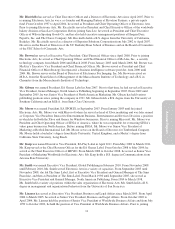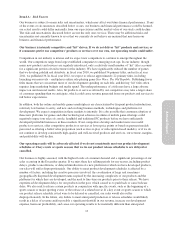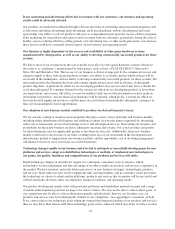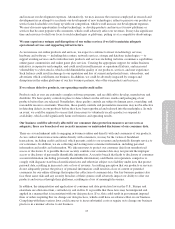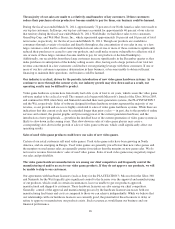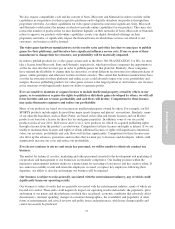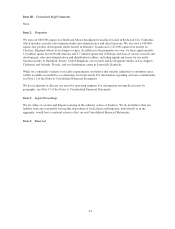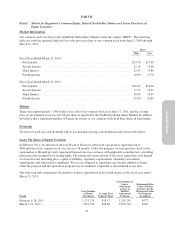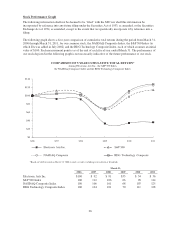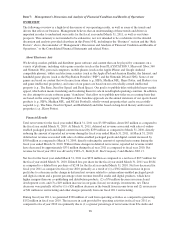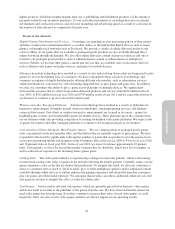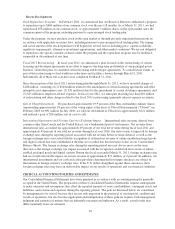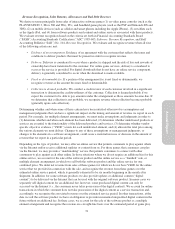Electronic Arts 2011 Annual Report Download - page 97
Download and view the complete annual report
Please find page 97 of the 2011 Electronic Arts annual report below. You can navigate through the pages in the report by either clicking on the pages listed below, or by using the keyword search tool below to find specific information within the annual report.
Annual Report
markets. We could be required to recognize impairment charges on the securities held by us and/or we may
realize losses on the sale of these securities, all of which could have an adverse effect on our financial condition
and results of operations.
Changes in our tax rates or exposure to additional tax liabilities could adversely affect our earnings and
financial condition.
We are subject to income taxes in the United States and in various foreign jurisdictions. Significant judgment is
required in determining our worldwide provision for income taxes, and, in the ordinary course of our business,
there are many transactions and calculations where the ultimate tax determination is uncertain.
We are also required to estimate what our tax obligations will be in the future. Although we believe our tax
estimates are reasonable, the estimation process and applicable laws are inherently uncertain, and our estimates
are not binding on tax authorities. The tax laws’ treatment of software and Internet-based transactions is
particularly uncertain and in some cases currently applicable tax laws are ill-suited to address these kinds of
transactions. Apart from an adverse resolution of these uncertainties, our effective tax rate also could be
adversely affected by our profit level, by changes in our business or changes in our structure resulting from the
reorganization of our business and operating structure, changes in the mix of earnings in countries with differing
statutory tax rates, changes in the elections we make, changes in applicable tax laws (in the United States or
foreign jurisdictions), or changes in the valuation allowance for deferred tax assets, as well as other factors. In
fiscal years 2009, 2010 and 2011, we recorded a valuation allowance against most of our U.S. deferred tax assets.
We expect to provide a valuation allowance on future U.S. tax benefits until we can sustain a level of
profitability or until other significant positive evidence arises that suggest that these benefits are more likely than
not to be realized. Further, our tax determinations are regularly subject to audit by tax authorities and
developments in those audits could adversely affect our income tax provision. Should our ultimate tax liability
exceed our estimates, our income tax provision and net income or loss could be materially affected.
We incur certain tax expenses that do not decline proportionately with declines in our consolidated pre-tax
income or loss. As a result, in absolute dollar terms, our tax expense will have a greater influence on our
effective tax rate at lower levels of pre-tax income or loss than at higher levels. In addition, at lower levels of
pre-tax income or loss, our effective tax rate will be more volatile.
We are also required to pay taxes other than income taxes, such as payroll, sales, use, value-added, net worth,
property and goods and services taxes, in both the United States and foreign jurisdictions. We are regularly under
examination by tax authorities with respect to these non-income taxes. There can be no assurance that the
outcomes from these examinations, changes in our business or changes in applicable tax rules will not have an
adverse effect on our earnings and financial condition.
Furthermore, as we expand our international operations, adopt new products and new distribution models,
implement changes to our operating structure or undertake intercompany transactions in light of changing tax
laws, expiring rulings, acquisitions and our current and anticipated business and operational requirements, our
tax expense could increase.
Our reported financial results could be adversely affected by changes in financial accounting standards or
by the application of existing or future accounting standards to our business as it evolves.
Our reported financial results are impacted by the accounting policies promulgated by the Securities and
Exchange Commission (“SEC”) and national accounting standards bodies and the methods, estimates, and
judgments that we use in applying our accounting policies. Policies affecting software revenue recognition have
and could further significantly affect the way we account for revenue related to our products and services. We
recognize all of the revenue from bundled sales (i.e., packaged goods video games that include an online service
component) on a deferred basis over an estimated online service period, which we generally estimate to be six
months beginning in the month after shipment. As we increase our downloadable content and add new features to
our online service, our estimate of the online service period may change and we could be required to recognize
21


